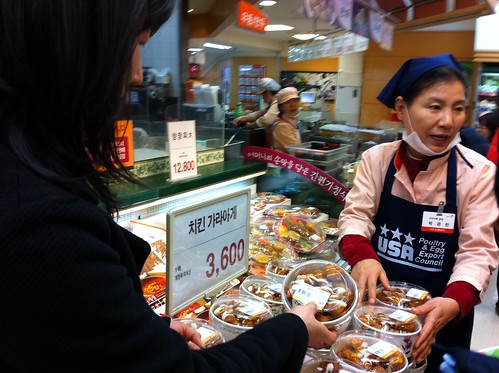
Through a variety of promotional activities in Korea, the U.S.A. Poultry and Egg Export Council (USAPEEC) is showcasing the quality and value of U.S. poultry products and promoting the benefits of implementation of the Korea-U.S. Trade Agreement (KORUS).
Currently, the United States is Korea’s second largest supplier of poultry meat with a one-third market share. Korea’s imports are primarily frozen chicken cuts. From 2008 to 2010, U.S. shipments of frozen leg and leg quarters to Korea averaged $33 million annually. If approved, the KORUS agreement would likely expand U.S. poultry and egg exports due to lower tariffs bolstering price competitiveness. Under the agreement, Korea’s 20-percent tariffs on imports in the dominant frozen leg quarter category will be phased out in 10 equal annual reductions, while tariffs on frozen breasts and wings will be phased out in 12 equal annual reductions.
Reverse trade missions bring international business leaders and agricultural ministry officials to the United States to learn more about U.S agricultural products and the benefits of importing those products. Following a USAPEEC reverse trade mission visit in 2010, a Korean company developed a new menu using U.S. chicken in ‘Fish and Grill’ restaurants, a fusion-style bar with 450 locations throughout Korea. In June, this restaurant chain launched three new menu items using U.S. chicken legs.

Promotional events held in 84 Lotte Mart stores throughout Korea also proved highly popular and effective. During these retail promotions, representatives from USAPEEC provided free samples to the shoppers to bring attention to the products. Since most consumers buy ready-to-eat items on the spot rather than planning ahead, this type of sampling promotion was highly effective. On average, these promotions resulted in a 40 percent increase in store sales of chicken. According to an on-the-spot survey, the consumers were impressed by the taste and the quality of the U.S. chicken.
These efforts, as well as other promotions conducted by U.S. cooperators and companies, are helping to grow the market for U.S. agricultural products in Korea. To read more about the benefits of the KORUS agreement for U.S. agriculture, visit the Foreign Agricultural Service website.



